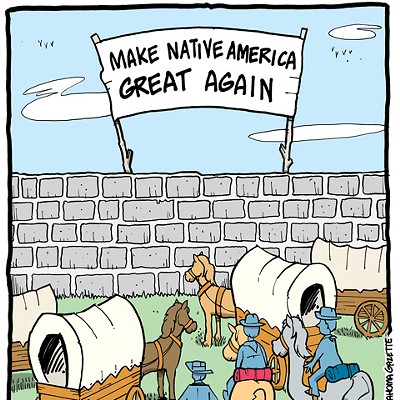The 100 Ideas initiative for Oklahoma " 100IdeasOK.org " is in full swing. Around the state, residents are coming together in groups to brainstorm policy ideas for Oklahoma's future. The inspiration for the 100 Ideas initiative comes from Florida, where former Gov. Jeb Bush sought input to craft a future policy agenda that would outlive his departure from office.
In Oklahoma, the 100 Ideas initiative comes not from a politician who is at the end of his formal influence in state politics, but from an aspirant speaker who still looks to the political future. At its most positive, Lance Cargill's 100 Ideas is an opportunity to frame a policy agenda that taps into public sentiments and takes the products of brainstorms to make policy. At its worst, 100 Ideas is criticized as a vehicle to direct corporate donations so that Cargill legally can enhance his political profile for major statewide office without the constraints of Oklahoma's vaunted ethics rules.
Personally, I like 100 Ideas at its best. In communities, people are coming together to sit down and hash out ideas that might just make it into policy. (In the back of my mind, I get this vision of Al Gore in a lab coat, surrounded by Bunsen burners and beakers, busily reinventing government.) I'm even helping facilitate an "IdeaRaiser" at the University of Oklahoma next month. However, I have an idea that I'd like to put on the table right now, what I will call the 101st idea, and it is an idea that legislators can make happen through a simple change in their rules.
The 101st idea is to open up the legislative process by allowing legislators to individually set priority bills. Initially, the priority bill approach would be used to allow every member of the state House to go to his or her district, formulate an idea and bring it back as legislation (in addition to the speaker, the House has 100 other members, so we still get 100 ideas). Each member, regardless of party or seniority, will be guaranteed a committee hearing and scheduled floor vote on that one idea. There is no promise that every idea will become law, or that every idea even will pass the House. A diversity of ideas will get a hearing in the broadest public venue in the state.
The 101st idea approach lessens the control of the agenda by the speaker and the majority party, to be certain. But, this approach is no threat to majority government or to the overall agenda of the speaker.
A variant on this idea, which could be made an institutional norm, is to create a priority legislation rule. Up in the Republican-dominated Nebraska unicameral Legislature, every member is allowed to set one bill per session as a legislative priority. The use of the priority stamp guarantees that the one priority bill will get a committee hearing, a reading on the floor and a vote. Not all priorities pass; not all priorities are significant legislation. But, the use of the 101st idea, the priority bill, guarantees members access to the legislative process and shows the public that a diversity of ideas is heard, even if the ideas are not implemented.
Gaddie is professor of political science at the University of Oklahoma and president of the Southwestern Political Science Association.












